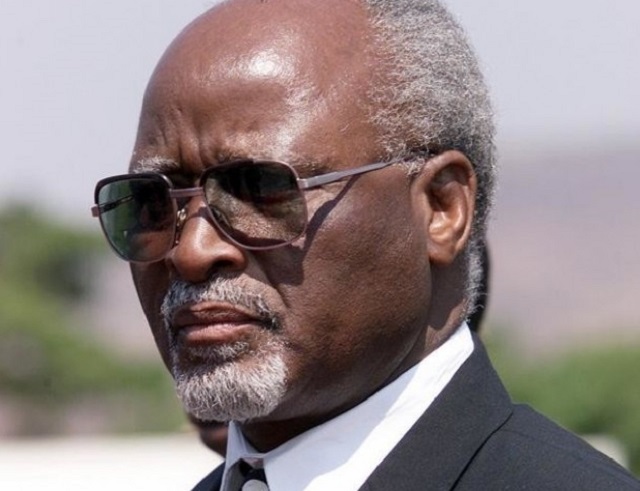John Landa Nkomo always a peacemaker

THE late Vice President John Landa Nkomo was a peacemaker who always underscored the need for the people of Zimbabwe to maintain peace.
He was born on August 22, 1934 in Tsholotsho District, Matabeleland North province. Cde Nkomo died on January 17, 2013 after succumbing to cancer.
He was 79.
The late Vice President dedicated his life to the struggle for the liberation of Zimbabwe.
He succeeded Vice President Joseph Msika who had died in August 2009.
Cde Nkomo was responsible for National Healing, Peace and Reconciliation in the inclusive Government (2009-2013), which brought together Zanu-PF and MDC formations.
His slogan “Peace begins with me; Peace begins with you; Peace begins with all of us” remains a clarion call for constructive co-existence and tolerance in the country.
He was one of the founding members of the African National Congress between 1958 and 1959. He joined the National Democratic Party (NDP) in 1960 before joining the Zimbabwe African People’s Union (Zapu) in 1961.
He was arrested on several occasions by the Ian Smith regime and detained at Gonakudzingwa restriction camp.
Cde Nkomo attended the Geneva Conference as part of the PF-Zapu delegation led by his predecessors, Father Zimbabwe Dr Nkomo in 1976.
Cde Nkomo had been in the liberation struggle since the mid-1960s during the NDP era while he was a teacher and a Bulawayo district official of the African Teachers’ Association (ATA).
ATA was a trade union organisation that protected and promoted the professional and socio-economic interests of black school teachers of Southern Rhodesia.
At that time, black school teachers taught only in what were called Group B schools. Those were, in fact, African schools.
European and Coloured or Indian schools were referred to as Group A schools. They had by far better facilities and infrastructure than Group B schools.
Teachers and non-professional staff-members from Group A schools were also better paid than those from Group B schools. ATA struggled against such socio-economic and racially discriminatory measures.
When Cde Nkomo joined the teaching service, ATA president was Caleb Somkence, son of Reverend Somkence who had been associated with the African National Congress of Southern Rhodesia in the late 1940s.
Caleb was politically associated with the European-led pro-federal party, the United Federal Party (UFP) and not with the African nationalist NDP. He was later sent to Lagos, Nigeria, as part of a federal diplomatic team headed by Mike Masocha.
The NDP was soon banned and Zapu was born. ATA national leadership changed when Jameson Mtetwa was replaced by former Midlands Governor Cde Cephas Msipa who was based in Salisbury, now Harare.
Under Cde Msipa’s presidency, ATA became more militant, leading to the arrest and detention of both Cde Nkomo and Cde Msipa. They and many other black school teachers were restricted to Gonakudzingwa where they joined their leader Dr Joshua Nkomo who was the Zapu president.
Upon his release from Gonakudzingwa, Cde Nkomo briefly worked for a Bulawayo industrial company but was still actively involved in politics.
He was one of the two ANC co-representatives in Zambia along with late Vice President Simon Vengesai Muzenda. They were duly received in Lusaka early in 1975 and opened an ANC office at the city’s African Liberation Centre.
Cde Nkomo worked closely with Dr Joshua Nkomo and became more or less his right-hand man.
In January 1978, a year after Jason Ziyaphapha Moyo’s death, Cde Nkomo was part of a Zapu delegation that left Lusaka for Valletta, Malta, to attend yet another British government’s attempt to ram down the throats of the people of Zimbabwe.
In the following year, Cde Nkomo and other Patriotic Front officials left for London to attend the Lancaster House Constitutional Conference that was used to confer nationhood on Zimbabwe on April 18, 1980.
It had been a long, demanding and risky haul from which the feeble-minded pulled out, but the gallant such as Cde Nkomo soldiered on until the objective of their patriotic dream, an independent and African-ruled Zimbabwe was achieved.
Cde Nkomo assumed several positions during his political career.
He was Member of Parliament, 1980-2000; Deputy Minister of Industry and Energy, 1981; Minister of State in the Prime Minister’s Office, 1982-84; Minister of Labour, Manpower Planning and Social Welfare, 1988-1995; Minister of Local Government and Rural Development, 1995; Minister of Local Government and National Housing, 1997; Minister of Home Affairs, 2000; Minister of State in the President’s Office responsible for Special Affairs, 2002; Speaker of Parliament, 2005-2008; Minister of State in the President’s Office responsible for National Healing, Reconciliation and Integration and Vice President, 2009 until the time of his death in January 2013.












Comments